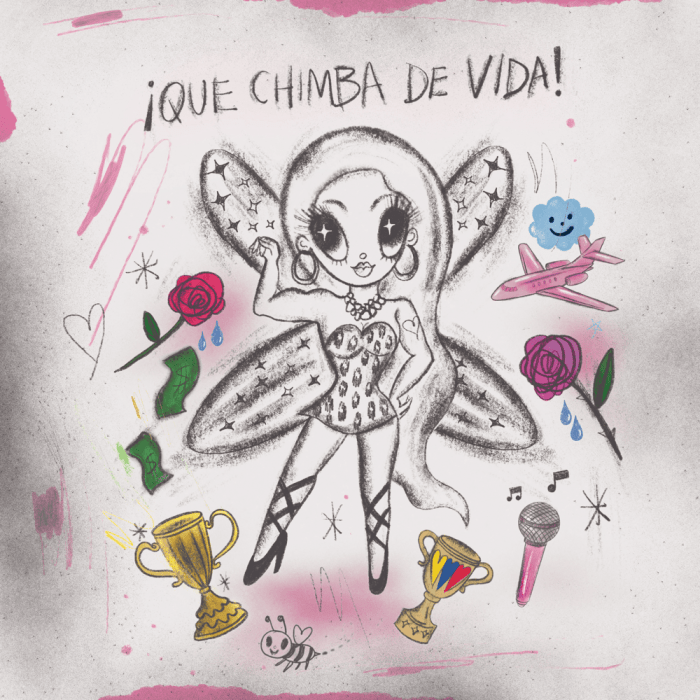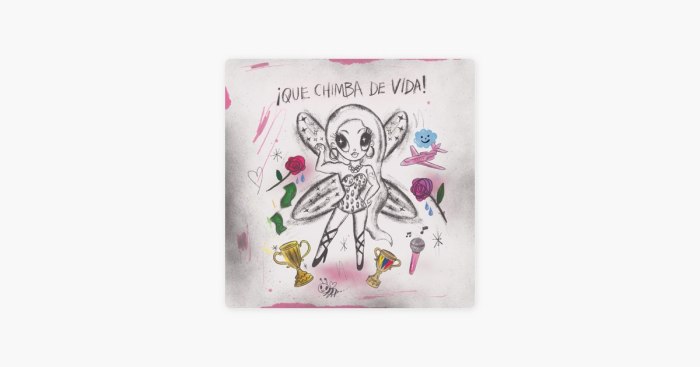Que chimba la vida in English, meaning “life is awesome,” captures the essence of embracing life’s adventures and appreciating the present moment. It’s a phrase that resonates with people from all walks of life, conveying a sense of joy, gratitude, and a zest for living.
This vibrant expression has its roots in Colombian slang, but its reach has extended far beyond its geographical origins. It’s now commonly used throughout Latin America and beyond, serving as a reminder to cherish the beauty and opportunities that life has to offer.
Cultural Context

In Spanish-speaking communities, the phrase “que chimba la vida” holds significant cultural weight. It serves as a multifaceted expression that conveys a range of emotions and attitudes towards life’s experiences.
The term “chimba” carries a connotation of excitement, thrill, or wonder. When combined with “la vida” (life), it becomes a vibrant expression of appreciation for the joys and adventures that life has to offer. It encapsulates a sense of enthusiasm, gratitude, and a positive outlook on life’s journey.
What a wonderful life! It’s a great day to indulge in something special, like the refreshing blue drink at Texas Roadhouse . With its vibrant color and sweet taste, it’s the perfect treat to complement the delicious food and lively atmosphere.
As you sip on this icy beverage, take a moment to appreciate the beauty of life and all the wonderful things it has to offer.
Usage Examples
The phrase “que chimba la vida” is widely used in various contexts and by diverse groups of people. It can be employed as an exclamation to express joy, surprise, or admiration. It can also serve as a general expression of contentment and appreciation for life’s experiences.
- A group of friends celebrating a birthday might exclaim “Que chimba la vida!” to convey their excitement and gratitude for the special occasion.
- A traveler witnessing a breathtaking sunset might utter “Que chimba la vida!” to express their awe and wonder at the beauty of the moment.
- An individual reflecting on their life’s journey might say “Que chimba la vida!” to acknowledge the joys, challenges, and overall experiences that have shaped their existence.
In essence, “que chimba la vida” is a versatile expression that captures the vibrant and multifaceted nature of life in Spanish-speaking communities.
Meaning and Interpretation

The literal translation of “que chimba la vida” is “what a great life.” However, this phrase carries a much deeper meaning and emotional weight in Spanish-speaking cultures.
The word “chimba” is a slang term that can be translated as “great,” “awesome,” or “cool.” It is often used to express excitement, admiration, or approval. When used in the phrase “que chimba la vida,” it conveys a sense of joy, gratitude, and appreciation for life’s blessings.
Nuances and Connotations
The phrase “que chimba la vida” is often used to express a sense of contentment and satisfaction with one’s life. It can also be used to convey a sense of wonder and amazement at the beauty and complexity of life.
In some cases, the phrase can also be used to express a sense of relief or gratitude after overcoming a difficult period in life. It can serve as a reminder that even in the darkest of times, there is always something to be grateful for.
Usage and Examples
The phrase “que chimba la vida” can be used in a variety of situations, with different tones and target audiences. Here are some examples:
- Context:Expressing excitement or joy
- Tone:Enthusiastic, positive
- Target audience:Friends, family, colleagues
- Example:“¡Que chimba la vida! ¡Gané la lotería!” (“Wow, life is great! I won the lottery!”)
- Context:Expressing relief or gratitude
- Tone:Relieved, grateful
- Target audience:Friends, family, colleagues
- Example:“¡Que chimba la vida! ¡Salí del hospital!” (“Wow, life is great! I got out of the hospital!”)
- Context:Expressing surprise or disbelief
- Tone:Surprised, disbelieving
- Target audience:Friends, family, colleagues
- Example:“¡Que chimba la vida! ¿No me digas que te vas a casar?” (“Wow, life is great! Are you telling me you’re getting married?”)
- Context:Expressing sarcasm or irony
- Tone:Sarcastic, ironic
- Target audience:Friends, family, colleagues
- Example:“¡Que chimba la vida! ¡Estoy tan feliz de estar atrapado en el tráfico!” (“Wow, life is great! I’m so happy to be stuck in traffic!”)
Regional Variations

The phrase “que chimba la vida” exhibits variations across Spanish-speaking regions, leading to distinct meanings, pronunciations, and usage.
The following are some notable regional variations:
Colombia, Que chimba la vida in english
- In Colombia, “que chimba la vida” is commonly used to express excitement or joy about a positive experience.
- The phrase is pronounced with a strong emphasis on the word “chimba,” which is pronounced with a closed “i” sound (/ˈtʃimba/).
Venezuela
- In Venezuela, “que chimba la vida” has a more colloquial and informal connotation, often used to convey a sense of relief or satisfaction.
- The phrase is pronounced with a softer emphasis on the word “chimba,” which is pronounced with an open “i” sound (/ˈtʃimβa/).
Other Regions
In other Spanish-speaking regions, such as Mexico, Spain, and Peru, the phrase “que chimba la vida” is less commonly used or may have different meanings.
Literary and Artistic Expressions

The phrase “que chimba la vida” has permeated Colombian culture, finding its way into various forms of artistic expression. In literature, authors have employed the phrase to capture the essence of Colombian life, adding depth and nuance to their works.
Literature
In the novel “Cien años de soledad” by Gabriel García Márquez, the phrase “que chimba la vida” is used to describe the complex and often bittersweet experiences of the Buendía family. The phrase encapsulates the joys and sorrows of life, highlighting the resilience and determination of the Colombian people.
Music
In music, the phrase “que chimba la vida” has been incorporated into popular songs, such as “La Vida Es Una Chimba” by Carlos Vives. These songs celebrate the vibrant and lively spirit of Colombia, encouraging listeners to embrace life’s challenges and opportunities.
Other Forms of Artistic Expression
Beyond literature and music, the phrase “que chimba la vida” has also found its way into other forms of artistic expression, including painting, sculpture, and film. Artists have used the phrase to convey the beauty and diversity of Colombian culture, showcasing the country’s rich heritage and traditions.
Modern Interpretations

The phrase “que chimba la vida” has undergone significant evolution in recent times, reflecting the changing cultural landscape and the influence of social media and popular culture.
Social Media and Popular Culture
Social media platforms like TikTok and Instagram have played a crucial role in popularizing “que chimba la vida” and expanding its usage beyond its original Colombian context. The phrase has become a trending hashtag, used in posts and videos that showcase moments of joy, excitement, and celebration.
This usage has further cemented the phrase’s positive connotations and made it a widely recognized expression of enthusiasm.
Popular culture has also contributed to the phrase’s evolution. Its use in music, television shows, and movies has further increased its visibility and made it a familiar part of everyday speech for many.
Positive and Negative Connotations
The expression “que chimba la vida” carries both positive and negative connotations depending on the context and intention behind its usage.
On the positive side, it can express:
- Excitement and enthusiasm for life’s experiences
- Appreciation for the beauty and wonder of the world
- A sense of gratitude for the good things in life
For example, someone might say “Que chimba la vida!” to express their joy at seeing a beautiful sunset or to celebrate a special occasion.
On the negative side, the expression can also be used to convey:
- Frustration or annoyance with life’s challenges
- A sense of resignation or hopelessness
- Sarcasm or irony
For instance, someone might say “Que chimba la vida!” sarcastically to express their disappointment with a situation or to vent their frustrations.
Ultimately, the interpretation of “que chimba la vida” depends on the context and intention of the speaker. It is a versatile expression that can be used to convey a wide range of emotions, both positive and negative.
Comparative Analysis

The phrase “que chimba la vida” is similar to other expressions in other languages that convey a sense of excitement, joy, or wonder about life. One example is the Spanish phrase “qué padre la vida,” which has a similar meaning and usage.
Another example is the English phrase “life is grand,” which expresses a similar sentiment of appreciation for the good things in life.
However, there are also some subtle differences in meaning and usage between these phrases. “Que chimba la vida” is often used to express a sense of surprise or amazement at something positive that has happened, while “qué padre la vida” is more commonly used to express a general sense of contentment with life.
Additionally, “life is grand” is often used in a more formal or literary context, while “que chimba la vida” is more commonly used in everyday speech.
Cultural Significance
The cultural significance of “que chimba la vida” is that it reflects the Colombian people’s optimistic and positive outlook on life. Despite the challenges that Colombia has faced, the people have maintained a strong sense of hope and resilience. “Que chimba la vida” is a reminder to celebrate the good things in life and to appreciate the beauty of the world around us.
Frequently Asked Questions: Que Chimba La Vida In English
What does que chimba la vida mean?
Que chimba la vida translates to “life is awesome” in English. It’s a phrase that expresses joy, gratitude, and a positive outlook on life.
Where did the phrase que chimba la vida originate?
The phrase originated in Colombian slang and has since spread throughout Latin America and beyond.
How is que chimba la vida used?
Que chimba la vida can be used in a variety of contexts, such as expressing gratitude, sharing joy, or simply appreciating the present moment.